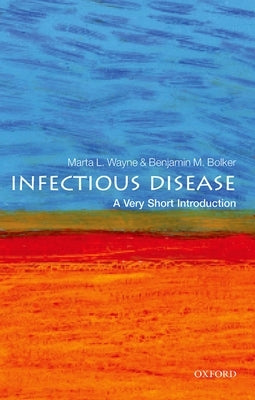Oxford University Press, USA
Infectious Disease: A Very Short Introduction
Infectious Disease: A Very Short Introduction
Couldn't load pickup availability
As doctors and biologists have learned, to their dismay, infectious disease is a moving target: new diseases emerge every year, old diseases evolve into new forms, and ecological and socioeconomic upheavals change the transmission pathways by which disease spreads.
By taking an approach focused on the general evolutionary and ecological dynamics of disease, this Very Short Introduction provides a general conceptual framework for thinking about disease.
Ecology and evolution provide the keys to answering the where, why, how, and what questions about any particular infectious disease: where did it come from? How is it transmitted from one person to another, and why are some individuals more susceptible than others?
What biochemical, ecological, and evolutionary strategies can be used to combat the disease? Is it more effective to block transmission at the population level, or to block infection at the individual level?
Through a series of case studies, Benjamin Bolker and Marta L. Wayne introduce the major ideas of infectious disease in a clear and thoughtful way, emphasizing the general principles of infection, the management of outbreaks, and the evolutionary and ecological approaches that are now central to much research about infectious disease.
ABOUT THE SERIES:
The Very Short Introductions series from Oxford University Press contains hundreds of titles in almost every subject area. These pocket-sized books are the perfect way to get ahead in a new subject quickly. Our expert authors combine facts, analysis, perspective, new ideas, and enthusiasm to make interesting and challenging topics highly readable.
Author: Benjamin Bolker, Marta Wayne
Publisher: Oxford University Press, USA
Published: 08/01/2015
Pages: 144
Binding Type: Paperback
Weight: 0.26lbs
Size: 7.00h x 4.18w x 0.01d
ISBN: 9780199688937
About the Author
Benjamin Bolker is a theoretical ecologist at McMaster University in Hamilton, Ontario. Starting from degrees in physics and zoology and a general curiosity about biological populations that change through time, he has used mathematical and statistical tools to understand a wide range of ecological, evolutionary, and epidemiological systems. In particular, he has studied the dynamics of disease in organisms as diverse as humans, red grouse, gopher tortoises, and fruit flies. Following a Ph.D. at Cambridge University studying measles epidemics and a postdoctoral fellowship at Princeton studying ecosystem carbon dynamics and competition among plant species, he was an assistant and associate professor at the University of Florida (where he developed his current hyper-diverse range of interests) before moving to McMaster University.
Marta Wayne is an evolutionary geneticist at the University of Florida in Gainesville, FL, USA. She first became interested in infectious diseases during her graduate work at Princeton University, when she found an intriguing pattern of molecular evolution in a viral resistance gene in fruit flies. She returned to the subject following a postdoctoral research fellowship in molecular quantitative genetics at North Carolina State University and later tenure at the University of Florida. Wayne is part of a small but energetic group working to develop Drosophila melanogaster and its viruses as a model system to understand host-parasite coevolution. She is also interested in the dynamics of virus evolution in humans.


